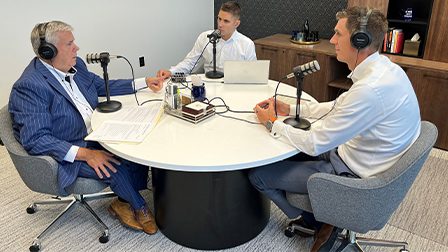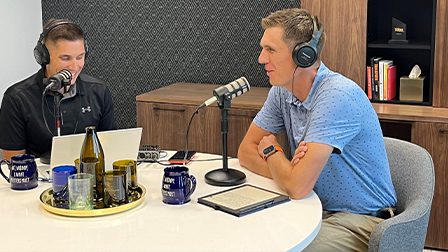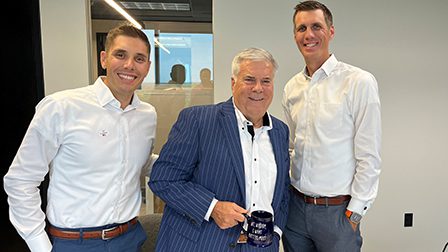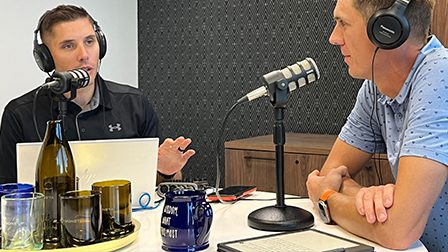Episode Transcript
Kyle: Welcome to episode number one of Wit, Wisdom, and What Matters Most – a podcast with Moneta’s Gast Freeman Troyer Racen Team. My name is Kyle Luetters, I’m an advisor on the team, and I am joined on this podcast by Danton Troyer, a partner on the team.
Danton, this is our debut episode…the mics still smell new; everything still works. But this has really been an idea that we have had for a while – to get together with folks and tell stories. At the end of the day, the big crux of what we’re trying to do here is tell some of these stories and there are some quite interesting ones.
Danton: Yes, we do financial planning on a day-to-day basis. It’s looking at numbers. But the reality Is, that’s not why we do this. So, the point of this podcast is to go a little bit deeper in these conversations and really talk about what actually matters most. And that’s different for everyone. So obviously everyone needs to make wise decisions with their finances and be sure you’re financially secure. But that’s not the full equation. If you don’t have a plan going into retirement, it could be a bumpy ride and not everybody thinks about it in the same way.
Kyle: Well, it’s funny you mentioned retirement because the first three episodes of our podcast are going to be devoted to that very topic. And we want to highlight retirement without recliners or rocking chairs, because I think there’s a cultural stigma that we experience that I’m going to retire and I’m just going to kind of sit around. I might play golf all day every day. I’m going to sit around and read or this or that. But you and I are going to find out in a lot of these conversations, there’s a number of folks that kind of wonder how they had time to work because now they’re so busy in retirement.
Danton: I’ve heard everything from as simple as doing puzzles, to playing the piano, to traveling the world. So, the answer isn’t the same for everybody, but having that conversation and at least thought process, I think is very valuable for everyone.
Kyle: Well, one of the folks that we’re going to talk to – the very first guest we’re going to have on here – is Charles Crossiant. Charles is someone that you have known for a while and just recently retired in the summer of 2023.
Danton: Yeah, Charles recently retired in July from Saint Louis University, and we’ve been having conversations and he’s been a client for well over 10 years. So, it’s interesting to know someone for that long and work with them and now it’s happened. He’s actually retired. It’s great on the financial side of things, but it’s just great to hear the stories and his success while being able to achieve his goal of retirement.
Kyle: Well, we’ll go on and get out of the way because now here’s our conversation with Charles Croissant.
Kyle: Well, Charles, welcome to the podcast. It’s good to have you with us here today. Thanks for coming by.
Charles: You’re welcome. It’s good to be here.
Kyle: So, you know, kind of tell us a little bit about how did you know it was the right time for you to retire?
Charles: I had planned, well, let’s see, I got into my long-term professional career. I got into that, you know, somewhat later in life and knew that I wanted to get as much earning time in as possible before I retired. So, I had always planned on working at least until 70. When I actually started at the place where I ended my career – St. Louis University – I started there in 2000. I would have been not quite 50 at that point, 48, I guess I was. I sort of knew going into that that I was going to want to work until I was 70. I had very good fortune at St. Louis University. I met my wife, Jackie, in 2002 and that was a terrific development because one thing that I do find is going into retirement as part of a couple, I think…well, I would not want to do it as a single person. I would much rather be part of a partnership. So that caused me to feel a good deal more stability about going into my later years and I think I would have felt different if I’d stayed single.
But even so, I knew that I wanted to work past 65, and I’d sort of envisioned 70 as my target age. I turned 70 in 2022, and so at that point I was thinking, you know, this is time to make an exit and it turned out to be a good time in a number of ways. Things that had nothing to do with me personally, but there was a change in leadership at the library where I was employed and the new director who came in and took charge. I began to feel early on that she and I weren’t really on the same page. She was a younger woman and didn’t have much of a sense, I don’t think, of the kind of work that I did which on a high level, we call cataloging where you put records that go into the online catalog for the books in the collection. And I was dealing with mostly foreign language books, a lot of European imprints from Germany, France, Spain, and Italy and subject areas like church history, philosophy, and theology and that was, I think, rather foreign to her background and when we talked it was literally foreign to her. I didn’t feel like there was a great deal of appreciation for what I was doing. So that really settled for me that yes, sometime that year would be the time to retire.
So, in the fall of 2022, right after I turned 70, I formally declared that I was going to retire on June 30th of 2023, and that’s what I did. So, it was knowing that basically I had spent as much time as I should in the place that I was and that it was time to step away from that. And also a feeling that things were changing and I see looking around me and other people of my age, you get the feeling that there’s a younger crowd moving in and beginning to take charge, and at least for me and I think also for my wife Jackie, there’s this feeling that that younger crowd doesn’t necessarily place a high value on the institutional knowledge that you have; they’d rather be left alone I think to do it their own way. So, it felt like it was a good time to leave and I was also affected in that whole process insofar as the colleague that I was closest to at the library was a man about my age I think he’s a year older than I am and similar academic background to mine, similar interests. He worked with the same subject areas that I did and he had let me know sometime before that he was going to be retiring in June of 2023, so we went out together. It felt good for both of us to be leaving at the same time and we had a joint party together to celebrate our going away and so it worked out really quite well.
But mainly for me, it was that financial consideration that I wanted to work at least until 70. I was interested in being able to put off applying for Social Security until I was 70 in hopes of getting the maximum benefit, which I did. So those were the things that guided me. I just wanted to make sure that I had earned enough basically to have a hope of a good retirement. And then I will say that, you know, the last 10 years or so that we’ve worked with Danton and Mike, it’s been very comforting for both of us that the positive reports they give us so you know, yes, you have the funds that you need to retire, so that made it easy to do.
Danton: I think as far as the time we’ve been working together, I think that has been your goal is age 70. So, as you approached that age of 70, you didn’t retire obviously on your birthday, but you did push it back a couple months. What was the thought process as you were just really in that final month?
Charles: Well, actually when it came down to it, I turned 70 in August 2022, and I enjoyed doing what I was doing and it’s an intellectual activity, so I was physically able to do it and all that kind of thing. I had some thought of continuing on some kind of a reduced time basis or something like that and that’s where I came to realize that the new head of the library was not interested in that, so I just went ahead and said well, in that case, I’ll just name the date of June 30th and leave then.
Kyle: You’ve done and mentioned a ton of things that we definitely need to unpack a little bit. There’s been moves, there’s been this and that, but I want to hone back in on your wife Jackie. Tell us about her story right now because I understand, is she still working right now?
Charles: She is still working. We married in 2008 and it was the first marriage for both of us and later in life for both of us. And she’s also a librarian; we met at the library at St. Louis University and then after we had been colleagues for a couple of years she took a different position with the American Association of Orthodontists and became the librarian at their headquarters which is here in St. Louis. For most of the time, that’s been a really good position for her, and then recently not so much, so she’s now looking forward to retiring, but she’s not quite there yet. She is a number of years younger than I am and at this point she’s 62, so she wants to sort of make it to,65 before she actually leaves and that’s fine. As far as that goes, I think we would both prefer to both be retired, but she has projects that she wants to wrap up and then, of course, the main consideration for her, and I think for a lot of people, is making it to 65 so that she can get Medicare.
Right if you don’t do that then you’re on the hook for all the money that needs to be spent on health insurance and she is not, you know neither one of us are, willing to pay what you’d have to pay if she retires early. so that’s the goal there it’s for her to work until she’s 65.
Danton: So, with Jackie still working, how are you guys finding your time, because I mean obviously, you have a lot more free time now and she’s still working, so how are you guys still coming together to spend time together?
Charles: Well, we still get up together and have breakfast together, part of our routine is that I always make breakfast, so I continue to do that and get her out of the house and on the way to work. And then you know I have to find ways to occupy my day, which is usually not a problem because there always seems to be chores to be done or some errands to run, that kind of thing. And then she gets home in the evenings and several times a week we go to the YMCA in Brentwood together and swim for 40 minutes or so, that’s our little exercise thing. Then we come home and get ready for bed. On weekends we’re just trying to get caught up with things and do a few errands, a little shopping, and occasionally maybe take a little trip somewhere just for the day.
Danton: Did you find that that was just natural, it just happened, or did you guys have a conversation that this is what we’re going to do?
Charles: I think it’s just sort of happened on its own. I wouldn’t say that we sat down and had a conversation about it. I can certainly always find things to do, that is definitely not a problem. In fact, I would say it’s more the opposite – that I’m still looking to balance things a little more so I have a little more time just to relax. I’m still busy with a number of things and, in particular, right now I’m on the council of the church that I’m a member of and have some committee responsibilities there that I’m dealing with. We’re working on upgrading the live streaming for our church services and I had to put together a little group to research what we were going to buy and who we were going to contract with, that kind of thing. So, there’s plenty to do around, things like that. I have at least one rehearsal, sometimes two rehearsals, a week for the choirs that I participate in and the other things that I enjoy doing. I’ve always played piano and for years I’ve had a good friend that we get together on a regular basis and we play piano duets together, and now that I’m retired we’re able to do that once a week which is nice. We used to do it well before COVID, and during COVID we had to stop for a while. But this past year we were able to get back into doing it. Back in the day, we often did it every other week, but now since I’m retired we’re able to do it once a week which I enjoy. So, I’ve got that and other little practicing and playing moments and, yeah, I find that really does a lot to fill up the time.
Kyle: There’s a number of folks that you talk to and they say that in retirement they’re so busy, they don’t know how they had time to work.
Charles: I do feel that too, and I go back and think about the work years and I don’t know how I managed back then because I certainly have plenty to do now and even now I could probably use a little more downtime than I actually have. I feel like I’m still seeking to find my way toward that kind of a balance. You know I’ve only been retired now since the beginning of July, so I look at it as it’s definitely a work in progress. I’ll find out how to best spend my time these next couple of years and then, of course, Jackie and I both know things will change a lot when she’s also retired. Then we’ll have to think about how to spend the entire day together which I look forward to and I know she does, too. But of course that’ll be a whole other adjustment on top of this one.
Kyle: Does she have like any has she expressed to you anything that she really wants to do? I want to get back to the choir and the piano, I think that’s interesting, But has she expressed to you anything on the top of her mind that she really wants to do? Is it travel? Is it taking classes together? Has she expressed anything to you that when she’s done working, what she really wants to do?
Charles: We’ve talked a good deal about the fact that we would both like to travel but I think that will be a few years away for both of us right now. We have to be thinking some about all of our parents being alive, my parents and her parents. Mine are in their mid-90s and we’re sort of focusing right now on being there to spend time with them. And Jackie’s parents are not far away in Cottleville, by St. Peter’s. But my parents are up near Chicago, so we travel up there three or four times a year to spend a week with my mom and dad. They’re in a very comfortable situation in a really nice three-stage senior community.
Danton: What has been the biggest surprise or just over the last couple of months maybe for you in your retirement?
Charles: It does feel different being retired and then trying to get your head around that I am retired, realizing that you have to figure out ways to spend your time trying to fit in the things that you want to get done around the house and that kind of thing. I would say just accepting the fact that all your questions don’t get answered right at once, as to how you’re supposed to be negotiating this. You just have to sort of let things be for a while and see how they develop on their own basically.
Danton: We had talked a little bit, kind of leading up, about beyond the dollars, what you wanted to do. But how much thought did you actually give leading up to retirement about how you’re going to fill your day versus maybe the reality of how you are filling your day?
Charles: I mean I had thought about a couple of things that I was interested in pursuing, and that hasn’t actually come to fruition yet. Like there was a friend who’s been retired for a number of years, and she years ago started volunteering at the St. Louis Art Museum as a docent and I thought that would be a really attractive thing to do. So I did make an attempt to get it to touch with somebody there, but so far that hasn’t borne any fruit. I think they’ve cut back on the number of training events they do for new volunteers in this program, so I’m still sort of waiting to see if anything comes of that. But in the meantime, I find that I’ve got more than enough to fill my time as it is and so I’m really okay with that. I’ve been glad that I have more time to play piano but I find that I’d like to be doing even more of that than I am and some of these other obligations that I’ve taken on are sort of pulling me away from some of these things I would actually prefer to be doing. So I’m sort of trying to figure out well what steps do I need to take – do I just need to accept that this is the way it is with my schedule right now and the level of responsibilities I have for some of these volunteer activities that will come and go, and I think I just need to relax and accept that.
Kyle: We’ve had a wonderful conversation with you and so glad that you are into this journey now even if it is abbreviated what you’re into it so far it’s still good to hear. I have one last question but I would be remiss before we go – we have a gift for you. It’s that mug that’s right here on the table and there’s a little treat in there for you as well. And we know you love coffee so we wanted to make sure that you had a little gift from us for being on the show.
But the last question I really wanted to ask is if you could go back in time, and I’ll let you pick however long that time is, what advice would you give the younger version of yourself heading into retirement that you wish you would have known?
Charles: I think in terms of my younger self I think I would say it’s been a huge improvement to my life to get married and I was 56 when I got married and I’m very glad I worked out that way. My experience certainly is that life has been better since I’ve been part of a couple and I’m very glad that I waited till I did because I think I’ve found the right partner. But I would certainly, people who are single and just starting out in life, I think I would definitely give them that advice to look around them and look for the right partner to be with. I wouldn’t want to be going through this part of my life as a single man, most definitely. And looking toward retirement has become a much more secure prospect for me since I got married. When I was a single man, I really had no idea at that point whether I would ever have enough money to retire on comfortably. And that fear went away once Jackie and I were married and both contributing income into these retirement plans. But I think that partnership is a very important thing and I would certainly, if the younger version of me or other people who are still single are listening to this then, I would say definitely do your best to look around you for the right partner.
Kyle: Good partnership leads to a great retirement. Charles, thank you very much for joining us today. I appreciate it.
Charles: You’re most welcome. Thank you; it’s been a pleasure.
Kyle: And Danton, that was a wonderful conversation with Charles Croissant. So great to sit down and talk to somebody that had really a unique story, working in library sciences for that long, met his wife in the same field. They find each other later on. And if you listen there at the end, them finding one another was really kind of one of the best pieces of advice he’d give a younger version of himself, was to do this together with somebody.
Danton: Yeah. I mean he had a lot of unique aspects to his retirement. But I think we all deal with a lot of these same thoughts as we’re heading into our retirement. And really there’s three points I had that came out of that:
The first one was just thinking about how do you stay active, socially engaged and just really mentally stimulated in retirement?
Kyle: And you know for Charles that was, you know, he mentioned the piano and the choir. He also mentioned that he is on a committee at church or several committees at church. He mentioned that he and Jackie go swimming together. So he’s really kind of hitting all of these points. And frankly, you know, when he started talking about making breakfast every day, it got me to thinking what does this guy make?
Danton: We should have asked him what his dish of choice is. We definitely missed out on the next time we see him. We’ll definitely have to ask.
I mean that’s really the second point is, you know, what is going to get you out of bed in the morning?
You know, you work for 20, 30, you know, sometimes 40 years and that’s your motivation to get up in the morning. And that all goes away. I mean if you haven’t thought about that, that can be life changing.
Kyle: Yeah.
And then kind of the last one that we had jotted down as well was, how does your self-identity shift in retirement?
And Charles talked about it just a touch about, you know, from working, working, working to, he kind of realized that maybe his identity was his work, but he started to get shifted out a little bit. And then the landscape changed a little bit, so it forced him, to a degree, to look into retirement. And I think he’s still new in it.He mentioned himself, it’s going to take a little while for him to really kind of figure the thing out.
Danton: Yeah. I mean, just as your working career has phases, I think so does your retirement. I mean, we think of, you know, the retirement is one phase, but there’s really different phases even throughout retirement. And we’re seeing that with, you know, Charles and I’m sure when Jackie retires, it’ll start a whole other phase for him.
Kyle: You know, it’d be interesting, I think here on future episodes, to do this again and then have Jackie come in with him and do like a compare-contrast type of a deal. That to me would be something to be a worthwhile conversation.
Danton: I agree.
Kyle: Well, 100 percent. Well, Danton, episode number one in the books, this was fun. And I look forward to doing more of these. We’ve got more folks and more things to talk about retirement.
But as we, you know, get ready to sign off here, what did you have the most fun? What stands out most to you from our conversation with Charles today?
Danton: Well, I’ve known Charles and Jackie for over 10 years now. And it’s just always good to hear beyond the dollars and cents, what’s, you know, their life, their life story. I mean, it matters.
And it affects the financial planning that we do as well as the why behind it. It really helps us do our job better as well.
Kyle: Well, you nailed it, my friend. So, until next time, enjoy what matters most.
Wit, Wisdom, and What Matters Most is a production of Moneta’s Gast, Freeman Troyer, Racen team, headquartered in St. Louis, Missouri.




© 2024 Advisory services offered by Moneta Group Investment Advisors, LLC, 100 South Brentwood Blvd., St. Louis, MO 63105 (“MGIA”), an investment adviser registered with the Securities and Exchange Commission (“SEC”). MGIA is a wholly owned subsidiary of Moneta Group, LLC. Registration as an investment adviser does not imply a certain level of skill or training. This is an advertisement. The information contained herein is for informational purposes only, is not intended to be comprehensive or exclusive, and is based on materials deemed reliable, but the accuracy of which has not been verified. Examples contained herein are for illustrative purposes only based on generic assumptions. Given the dynamic nature of the subject matter and the environment in which this communication was written, the information contained herein is subject to change. This is not an offer to sell or buy securities, nor does it represent any specific recommendation. You should consult with an appropriately credentialed professional before making any financial, investment, tax, or legal decision. Past performance is not indicative of future returns. You cannot invest directly in an index. All investments are subject to a risk of loss. Diversification and strategic asset allocation do not assure profit or protect against loss in declining markets. These materials do not take into consideration your personal circumstances, financial or otherwise. Trademarks and copyrights of materials linked herein are the property of their respective owners.



